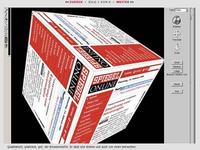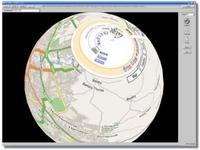|
|
3 Jul 2010 @ 07:01, by johnjoseph. Technology
Association is a process and technique which recently i have suggested can be used for aiding searches and connected technology, and which can provide an alternative to the traditional logic and syllogism of Greek thought. It is manifested in such diverse systems of thought as Plato's Forms and Jung's Archetypes and in itself creates the possibility of psycho-spiritual technologies.
Psycho-spiritual Technologies
21 Feb 2010 @ 16:40, by John Grieve
Heart and Soul Technologies
Whereas any practical application of a scientific theory is termed a technology, it should be possible to establish what I term "psycho-spiritual technologies", if it is indeed possible to unite conventional quantitative science with qualitative mysticism.
Also, as many writers have pointed out, while the physical, material technologies which are extensions of the human body have proliferated and reached unthought of heights, the same is not true of the powers of the human mind/ soul/ spirit.
If humanity is to grow up and mature, as is obviously a critical need at the present moment, psycho-spiritual technologies must be acknowledged for what they are.
More >
|
|
|
|
 19 Jun 2010 @ 23:10, by ming. Technology 19 Jun 2010 @ 23:10, by ming. Technology
Seems like some stimulating conversations will get me out of hiding. OK, I wasn't really hiding, I just wasn't blogging.
There are certain things on my list of what I'm here to do. Sounds nebulous to people who aren't plugged into the same kind of stuff. Wiring of the global brain. Emergence of collective intelligence. Tools for creativity. Building a new civilization. Conscious evolution. Self-organization. Collaboration.
They've sort of been on hold for me for a while. At least after I realized that one can't avoid having to make a living, however much that sucks. So I added to my list of interests: Escape velocity. Organizing viable activities. Even: Internet marketing. And: Managing beliefs. Living deliberately.
I'd prefer to spend my days inventing stuff that will change the world. Maybe I will, once I get a couple of key things in place. But there's no reason to procrastinate either.
A couple of recent conversations has made me realize that there are smart people out there working on the kind of stuff I'm into. Which makes me rather hopeful. It might indeed be time to wake up and start the generators again. More >
|
|
|
|
   9 Feb 2010 @ 20:13, by feecor. Technology 9 Feb 2010 @ 20:13, by feecor. Technology
Berlin is again
beside the Transmediale [link] and the Berlinale [link] full of media glitter and creative media movers and shakers. What a time... We are at the edge to thinking deep - not new for me as 3D vizualisation was my think & do "thing" (in deep and in colour since 25+ years), but only now the technology is at the edge of reaching the public eye and mind as we can see in movies and interfaces.
I will hop between the events and lounges , and my heart and concerns are with immersion into old & new spaces, as an old and new door and vistas opened, for example with new intefaces. See gesture cubes ! [link] or what we called Advanced Visual Interfaces. [link] Interfaces even for Cultural Heritage ! - see also this more recent virtual worlds proposal: [link]
Going from 2d-3d is not new for me, from flat to deep and maybe also from Show to Schau ! [link] and being aware of interface design and immersion or the challenges of virtual reality [link] , but what it means to have all walls as monitors and connect the space in-between still rocks my mind. I know that we need spaces for knowledge in modern times of internet and media, like we need space for living, if we do not want to end in the noise of Cyberculture, and I know we can agree on spaces and frames, orders and rules, like we can agree to drive on the right lane and stop at the red light. But who dares to challenge orders and frames, not by postmodern irgnorance, but by negotiating, creating and moving line and objects. I always come back to the citation of Rueckert, maybe someone will check it out and help translate it to the modern media age!?
Whoever imagines mental deep permeable barriers which actually do not exist
and then thinks them away, has understood the world.
As space is entrapped in geometry's network of lines,
thought is caught in its (own) inherent laws.
Maps make the world comprehensible to us;
we are still waiting for the star-maps of the spirit.
In the same way than ambling through fields we risk getting lost,
the spirit negotiates its terrain.
Friedrich Rückert, Wisdom of the Brahmins, a didactic poem, Charles T. Brooks in 1882 – above is unfortunately only a clumsy first translation by Robinson/Benking as we could only get hold of the original German version. More at BRINGING DOWN NEW WALLS: [link]
So maybe we can find ways together between the movies, media, and realities locally and globally instead of being sumbmerged in the glut of endless, no-return Cyberculture [link]
If you care to see what agreed frames and spaces might look like, goto: TONY [link]
or check out what we mean by deep and flatworlds: [link]
A footnote:
I am shocked getting today this [link] to get a Journal covering the topics above for a subscription of 500+ Dollar per year. See still high tech with lots of insider development potentials.
  
|
|
|
|
 13 Nov 2007 @ 16:55, by jhs. Technology 13 Nov 2007 @ 16:55, by jhs. Technology
Important Security Update for Girapoli Available
November 13, 2007. The International Girapoli Foundation releases an important security update for Girapoli. All users should upgrade to the latest version of the Girapoli Preview Release. A patch is available for current Preview Release users.
Getting the Update:
* Girapoli Preview Release (Girapoli 0.10) users: To update Girapoli, open your Polar Dynamics 1 book and go to the Advanced section. Add this security bulletin together with a printout of the Girapoli procedures on this website. You will need to restart Girapoli after installing the patch.
* For users of versions prior to Prevew Release, study Polar Dynamics and the Girapoli procedures on this website BEFORE attempting to start up Girapoli.
Questions & Answers:
How does this security vulnerability expose the user? More >
|
|
|
|
24 Jul 2007 @ 12:45, by anandavala. Technology
Before joining the conversation, please read and accept this Invitation to a Conversation.
I have recently begun to take a new approach, not focusing on
explanations but instead on concrete demonstrations, instead of
producing essays about ideas I'll focus on producing concrete
products such as ontologies, software, etc.
I have also been looking into ways to get the message across. I
have decided to look into developing SMN and thereby giving the mass
consciousness what it wants - this will help to get its attention.
Understanding New Technology
First a quote from an article about XML, B2B and The
XML/edi Group...
/quote
Gerry Galewski, a philosopher on information
technologies, gave a provocative explanation on why it often takes
years to truly appreciate the full potential of new technology:
"... when a breakthrough in technology is achieved, it takes
us a while as a culture to figure out what we really have. New
developments are culturally assimilated often based on what has come
before. We can't help but place the new developments within an
historical context.
"Here's an example: In 1844 Samuel Morse invented the ability
to transmit information coded into electromagnetic pulses. He sent
the first message of dot dash dot dot dash from Baltimore to
Washington DC, and therefore people called this telegraphy.
"That first message Morse sent was 'What hath God wrought.'
Telegraphy became ingrained into the cultural consciousness. It was
easy to understand and deploy.
"Fifty years later, Marconi made a technological
breakthrough. He broadcast electromagnetic waves through the air. But
what did he send? The ability to modulate a signal was well
understood. But Marconi sent dot dash dot dot dash. That is what was
ingrained into the cultural consciousness of the time. So people
called this wonderful new tool, simply "Wireless Telegraphy."
Within their frame of reference, they didn't know what they really
had. It took another twenty years for Lee Deforest to apply practical
knowledge that had been around for decades. Deforest had the Eureka
event, and gave us radio. More >
|
|
|
|
 26 Apr 2007 @ 15:56, by ming. Technology 26 Apr 2007 @ 15:56, by ming. Technology
Earlier I was lamenting my lack of success in having a browser that works for me on my Mac. But I hadn't seriously tried OmniWeb, and it was sort of the only remaining browser after Firefox, Opera and Safari. I hadn't given it much attention, because it is the lesser known, and it isn't free. Only $14.95, which is perfectly alright, but that was enough of an obstacle that I hadn't seriously tried it.
And, as it turns out, OmniWeb is the only browser that solves my showstopping problems. Mainly that if I use the other browsers the way that comes naturally to me, at the end of the day my machine would have slowed to a grinding halt, and I see the spinning beachball for several seconds no matter what I push. There are other things that are nice to have, but that in itself far outweighs all the other concerns.
Part of the secret is that OmniWeb has several separate Workspaces. That is, one can have collections of windows and tabs, and they're kept separate from one another. So, I can have 30 sites open without them all showing at the same time and the one with bad javascript slowing everything down. I see just the windows and tabs I'm working on. When I switch out of a workspace, it still keeps running for an hour or so, so if I went back to it, it would be there instantly. If it is longer than an hour, it would need to load the pages again, but everything would still come back like I left it, rather quickly.
After two weeks of using it, I haven't had that slowdown experience at all. So, they must be doing something right in terms of managing resources.
OmniWeb has a system of "tabs" which aren't like tabs in the other browsers. Not little folder tabs along the top. Rather, they're small snapshots showing in a sidebar to the left. Which is a bit odd as far as tabs go, but it actually works very well.
There'd still be a bunch of things I'd miss from FireFox, like the FireBug javascript debugger, and various other plugins and add-ons for dealing with pictures, showing Google PageRank and things like that. But the other thing that really irritated me with Firefox - that a download of any file would take 10 seconds to start, freezing all activity in the meantime - no problem like that in OmniWeb. Opera and Safari don't have that problem either.
OmniWeb uses the same engine for rendering pages as Safari, the built-in Apple WebKit, which seems to work fine. More >
|
|
|
|
 5 Jun 2006 @ 21:41, by ming. Technology 5 Jun 2006 @ 21:41, by ming. Technology
So, Reboot was great. One of the best tech conferences around. Not that I go to many conferences these days, but I heard that said a number of times. See the list of participants, the program, blog posts via Technorati, and shared photos via Flickr.
The theme was renaissance. I can't think of a better theme. Ben Hammersley gave a hilarious (as usual) presentations on "How to be a Renaissance Man".
Otherwise, great speeches by Doc Searls, Stowe Boyd, Rebecca Blood, Hugh Macleod, Euan Semple, Loic Le Meur, Lee Bryant and many others, but those were some of the more well-known characters.
Particular topics I find interesting: The Global Microbrand, i.e. come up with something really unique and present it to the whole world; mobile or geo-aware applications of various kinds; practical application of standard tools and protocols (blogs, wikis, RSS, etc) for better information systems; Creativity; Participatory Culture; new kinds of economies. And Renaissance.
I would have liked more space for deeper dialogue. OK, the best value of conferences is usually in who you meet in-between, but it would be nice if it actually was scheduled more. You know, one spends most of the time listening to people who talk to you, one-way. That's a little tiring in length. I'd want to do something too.
Overall, very enjoyable, well-organized, by people who have a clue, and fun gettogethers before and after the conference. More >
|
|
|
|
 3 Mar 2006 @ 18:01, by bushman. Technology 3 Mar 2006 @ 18:01, by bushman. Technology
Again, high school kids find a way, to make efficiant use of alternitive fuels. In my own engine set up, I've been able to get the 0 to 60 in 4 seconds, but not the MPG, so far, best I can get is 27mpg, it's still better mileage than the stock 13mpg you get from a big engine.
But these kids, being misfits and dropouts, finding a class they like, and not only comming up with a cool engine set up, but also self esteem to get better grades, and really make a differance in the world.
Hopfuly they don't get shot down by the automotive and oil industries. :}
"The CBS news article below reveals a major breakthrough in car engine design. This car engine gets over 50 mpg, goes from zero to 60 in four seconds, and runs on soybean oil! So why isn't this remarkable breakthrough making front page headlines in all major media? For the same reason that many other major energy breakthroughs have been reported but never given the headlines they deserve. Those who are reaping huge profits from oil sales have much more political and media influence than you might imagine."
Full story and additional links:
[link]
Original story:
[link] More >
|
|
|
|

4 Jan 2006 @ 04:39, by letecia. Technology
I am a bookaholic. I love books!!! I have wanted to find a way to organize and track my personal library. I decided to try out BookDB:
"With BookDB you can enter all your books with author, category, publisher etc and print them out in a variety of formats. Why would you need such a thing? Well, if you're always going to book sales and buying bargains only to get home and find you've doubled up, take a printout with you! BookDB has a super-condensed print mode so you'll need a magnifying glass, but at least it'll save a tree or two.
BookDB also has lending library features. With them, you can add borrowers, loan out books, add multiple copies and so on."
from [link]
I have entered about 10 books so far and like what I see. If anyone else out there has a favorite software the use to track their books, I loved to hear about it.
Oh the best part about this is it is Freeware!
|
|
|
|
30 Sep 2005 @ 11:27, by swanny. Technology
Howdy just trying out the Opera web browser
It seems pretty good with a few different features
I find most browsers to be pretty similar.
I've tired Firefox, Navigator, Epiphany, Modzilla,
Internet explorer, Safari and a real old one made by and
for Java. I find not much significant difference between them
I suppose some are a little faster but I suppose in the end
its like just different colors for the same model T. I guess some have different "skins" that give a different show but the nuts and bolts seem to be pretty basic. Oh there was this one I tired that only did web cams that was pretty neat and this other one called Earth browser but it was difficult to use.
Anyway opera is free for the moment with no ads so i thought i'd give it a whirl. Actually I suppose there is some difference as I tend to use different browser depending on what the thing I wish to accomplish is. More >
|
|
Page: 1 2 3 4 Older entries >> |
|